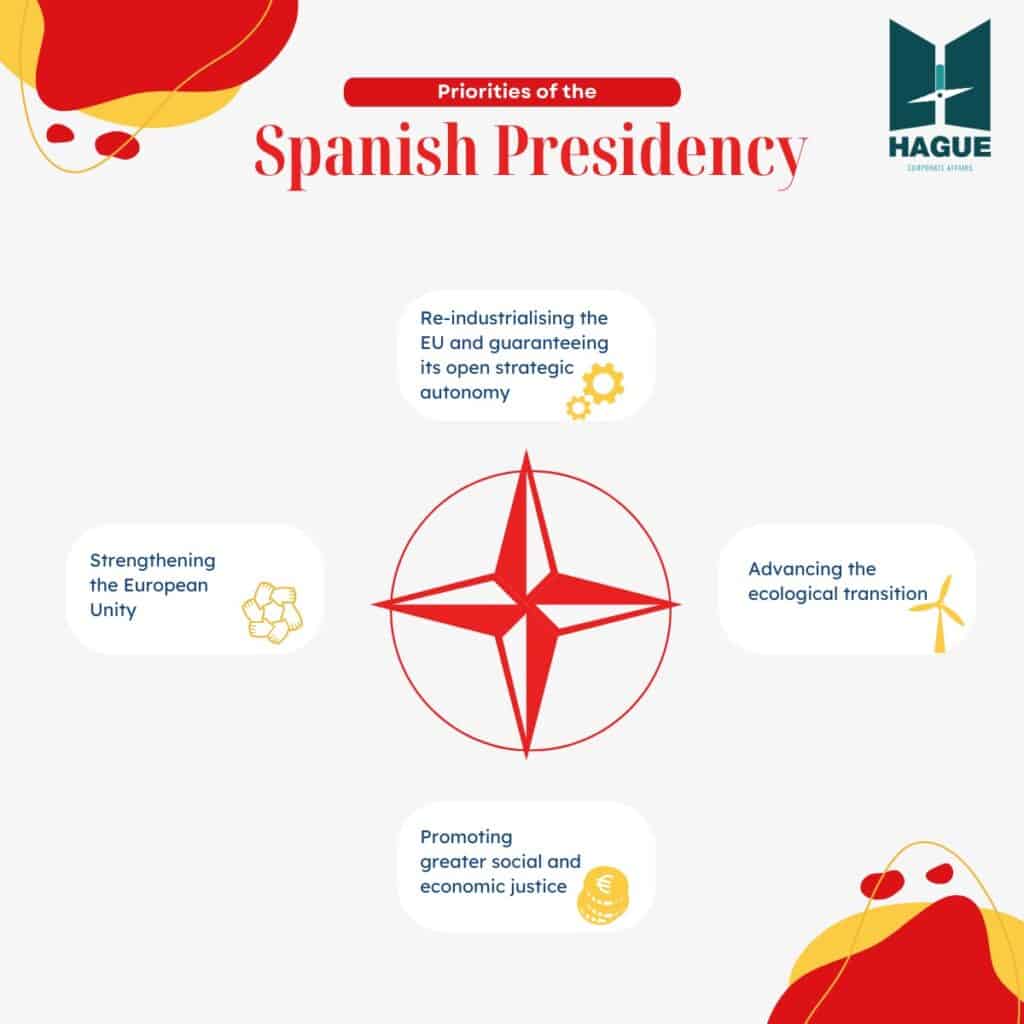
The future of aviation: going beyond challenges to net zero
The future of aviation: going beyond challenges to net zero Commercial aviation
On 1 July, Spain took over the Presidency of the Council of the European Union until the end of the year, for the fifth time in its history. The country takes the lead of the last full Presidency term ahead of the EU elections in June 2024, and will therefore have the responsibility to lead and – attempt to – conclude negotiations on key EU dossiers, before giving the floor to Belgium for a final sprint in the first quarter of 2024. Spain has identified four key priorities to guide its six-month term: reindustrialisation, ecological transition, social justice, and strengthening European unity. Advisors Nino and Federico will delve into each of these priorities and explore the actions that Spain intends to undertake during its Presidency.
The EU has experienced immense benefits from international openness over the past seven decades, leading to economic growth and social welfare. However, this openness has also resulted in the offshoring of strategic industries, making the bloc excessively dependent on third countries. The EU aims to reverse this trend by attracting new companies and jobs to Europe while reducing dependencies on market fluctuations. To this end, the Presidency will promote the development of strategic industries and technologies, expand trade relations, and strengthen supply chains. Within the EU, this would mean expanding and diversifying trade relations via, among others, re-engaging regions of the world such as Latin America and the Caribbean. Furthermore, the Presidency will develop a comprehensive strategy to ensure the EU’s economic security and global leadership by building upon the roadmap agreed upon by all 27 Member States in Versailles in March 2022.
Curbing climate change and environmental degradation is not only an obligation but also a great opportunity for Europeans. The EU has prioritised the green transition, aiming to decrease reliance on energy, reduce expenses, boost competitiveness, and generate new job opportunities. To foster this transition, the Spanish Presidency will work on reforming the electricity market to accelerate the deployment of renewable energy and improve system stability. It will also prioritise legislative files related to the EU’s Fit for 55 Agenda, such as the Gas and Hydrogen package and Energy Efficiency Regulation. Additionally, measures will be taken to reduce waste, tackle microplastics, promote sustainable products, and produce green fuels.
In order to ensure that economic growth benefits all citizens and improves living standards, the Presidency will actively advocate for the implementation of minimum and consistent standards for corporate taxation across all Member States. Additionally, the Presidency intends to review the Multiannual Financial Framework 2021-2027 and reform fiscal rules with the objective of moving beyond austerity measures, promoting transparency, and achieving a sustainable balance between public finances, green transitions, and digital advancements. The extension of workers’ rights and the protection of vulnerable groups will also be prioritised.
In a world characterised by uncertainty and increasing geopolitical tensions, the unity of the EU is paramount. During the next six months, Spain will focus on deepening the internal market, completing the European Banking Union and Capital Markets Union, and consolidating and improving instruments like the NextGenerationEU funds. Furthermore, efficient and coordinated management of migration and asylum processes, as well as coordinated support for neighbouring states like Ukraine, will be prioritised. Lastly, fostering a shared European identity and values will be emphasised to further strengthen the European project.

The Spanish Presidency has already started; however, Spanish Prime Minister Sánchez from the centre-left party PSOE (Partido Socialista Obrero Español) might have to leave his post very soon, as the next Spanish parliamentary elections are coming up on 23 July. Sánchez called an early general election following the defeat of his party in local and regional elections at the end of May. According to polls, the centre-right party PP (Partido Popular) is expected to win the elections, which might lead to the creation of a new ruling coalition together with the far-right party Vox.
Should EU citizens and businesses be concerned about a potential shift in political leadership? Even with a change in power from centre-left to centre-right at national level, the upcoming elections are unlikely to affect the Spanish Presidency: the priorities and action plan for the next months have already been defined and approved, and it is not in the interest of Spain – independently from the new ruling coalition – to change them and create instability.
Do you want to know more about the work of Spanish Presidency of the Council of the European Union on its different priorities? Subscribe to the newsletter and receive quarterly blogs from our advisors in your inbox.


The future of aviation: going beyond challenges to net zero Commercial aviation

From cooperation to strategic partnership A necessary paradigm shift for a successful,

New EU packaging rules: a more tailored approach is the key to